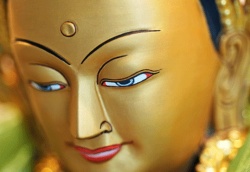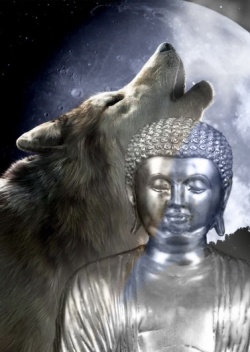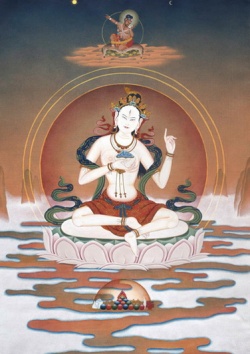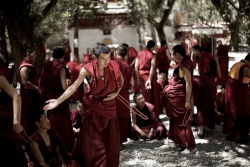Difference between Dzogchen and Shentong
"The problem with shentong, which CHNN has addressed many times, is that in Dzogchen the result exists as a potentiality of the basis; but in Shenton it is fully formed at all times. For this reason, in several retreats ChNN has declared that shentong is incompatible with Dzogchen."
In Dzogchen the result exists as a potentiality of the basis along with secondary conditions as part of lhun grub or unafflicted dependent origination. This means the result (buddha's qualities) arises as one of the possible appearance of wisdom. But it is nothing inherently existing anywhere, merely manifest when conditions are there. It is in the form of actualizing buddha nature through conditions. "in Shenton it is fully formed at all times." - The buddha qualities in Shentong are inherently existing in ourselves, so there is no need for any conditions and it is only a matter of discovering something inherent. This teaching does not factor conditionality in terms of result and may have a danger of falling into a view ot true existence/inherency. That means the luminosity aspect may be reified into something that truly exists, that is one of the dangers. While non-shentong teachings of madhyamika may have a tendency towards nihilism if wrongly interpreted.
So when we understand the principle of potentiality, this means nothing exists in and of itself, the basis is empty of any inherent existence but has limitless potential that manifests according to conditions.
Something I wrote before: "Buddha-nature is this total exertion, it is not a hidden noumenon or a latent thing that ‘produces’ the myriad things, nor is it something that truly exists hidden waiting to be discovered – that is a mere dead image we form about Buddha-nature that has come to past.
It is the entire universe of complete seamless interpenetration that is ‘exerting’ Buddha-nature in a completely dynamic, ever-advancing state of self-actualizing. We are not discovering Buddha-nature so much as to be actually “creating” it every moment. Or you can say we are simultaneously discovering, renewing, creating, and casting-off Buddha-nature every moment (yet this Birth and Death IS precisely No-Birth and No-Death)."
Padmasambhava:
Just as is the case with the sesame seed being the cause of the oil and the milk being the cause of butter,
But where the oil is not obtained without pressing and the butter is not obtained without churning,
So all sentient beings, even though they possess the actual essence of Buddhahood,
Will not realize Buddhahood without engaging in practice.
"what is the relationship between mind and rigpa"
Mind is the same as it is in prasanga madhyamaka, completely dependently originated and forming through the same process that everything apparently existent arises from (the 12 nidanas). Mind is called sems in dzogchen and is the driving force behind samsaric (afflicted) proliferation.
Rigpa is knowledge of the nature of mind, the nature of mind is the nonduality of the mind's essence (emptiness) and nature (clarity). All dependently originated. Rigpa is equivalent to enlightenment in the classical sutras, it's 100% empty and illusory. Everything is illusory in dzogchen.
"and awareness and emptiness?"
The term awareness is used alot in d-word translations, and the translations do have the potentiality to convey a very advaita like feel to the teaching when they're merely read at face value. There's also buddhist dzogchen and Bon dzogchen, the bon dzogchen tends to be somewhat more essentialist since it doesn't have a buddhist foundation and it also claims that the dzogchen view of emptiness and the buddhist view of emptiness are different, buddhist dzogchenpas disagree. But overall awareness is also dependently originated and therefore illusory and unestablished.
Emptiness is the same, everything that appears is empty. There is however afflicted dependent origination and unafflicted dependent origination. Afflicted dependent origination is appearance which is product of ignorance (ma-rigpa) and unafflicted dependent origination is lhun-grub or the natural formation of the basis.
" The basis in Dzogchen is completely free of affliction, it therefore is not something which ever participates in afflicted dependent origination. Unafflicted causality in Dzogchen is described as lhun grub, natural formation. However, since there is causality in the basis, it also must be empty since the manner in which the basis arises from the basis is described as "when this occurs, this arises" and so on. The only reasons why this can happen is because the basis is also completely empty and illusory. It is not something real or ultimate, or truly existent in a definitive sense. If it were, Dzogchen would be no different than Advaita, etc. If the basis were truly real, ulimate or existent, there could be no processess in the basis, Samantabhadra would have no opportunity to recognize his own state and wake up and we sentient beings would have never become deluded. So, even though we do not refer to the basis as dependently originated, natural formation can be understood to underlie dependent origination; in other words, whatever is dependently originated forms naturally. Lhun grub after all simply and only means "sus ma byas", not made by anyone.
Rigpa is not a phenomena, it is not a thing, per se. It is one's knowledge of the basis. Since it is never deluded, it never participates in affliction, therefore, it is excluded from afflicted dependent orgination. However, one can regard it as the beginning of unafflicted dependent origination, and one would not be wrong i.e. the nidanas of samsara begin with avidyā; the nidanas of nirvana begin with vidyā (rigpa)."
"Is rigpa empty?"
Completely.
"Is it a synonym of awareness in those translations?"
Not at all, the term awareness is just pointing to the fact of present wakefulness.
"Pragmatically, as Dzogchen is taught on the ground, what aspect does the lion's share of the soteriological work?"
This is the part that really defines dzogchen, the aspect that does the lion's share of the work is the fact that dzogchen is precisely the knowledge of the natural state (rigpa) and is therefore enlightenment itself. So it's not a causal vehicle that really incorporates 'work' because the basis, path and fruit are all simultaneously accomplished. The teacher points out the natural state, and the student either recognizes it or doesn't. If it's not recognized then there are teachings which aid in discovering that aspect, but the teachings themselves aren't dzogchen, dzogchen is only the experience and is therefore actually indescribable (though much describing happens naturally!)
"Does Kagyu teach Dzogchen?"
I'm pretty sure Kagyu focuses on mahamudra, and they actually tend to subordinate dzogchen as just another means no different than mahamudra, when there are big differences.
Also the Kagyupas (being that they focus on mahamudra) designate thoughts and emotions as the dharmakaya, and dzogchen does not.
"What is the difference between Dzogchen and Mahamudra?"
Mahamudra and dzogchen are different methods and therefore end up being different paths. Mahamudra considers the basis (nature of mind) to be the kun-gzhi or alaya, which is the emptiness and clarity of the mind. In dzogchen the kun-gzhi is considered to be the basis of affliction (ignorance) and the basis (gzhi) in dzogchen has nothing to do with the mind. I recently attended a teaching by a guy named Keith Dowman and he was also teaching that the nature of mind was the kun-gzhi, I asked him what the difference is between the kun-gzhi and the gzhi and he said that it has to do with further refinement "purification" and release of subtle traces, but he said for now during that talk there was no need to get into that (being that the crowd in general had some people who were actually just learning of dzogchen for the first time).




